新译林版7A--Unit4知识点及考点练习
牛津译林版英语7A Unit4 My day知识点归纳
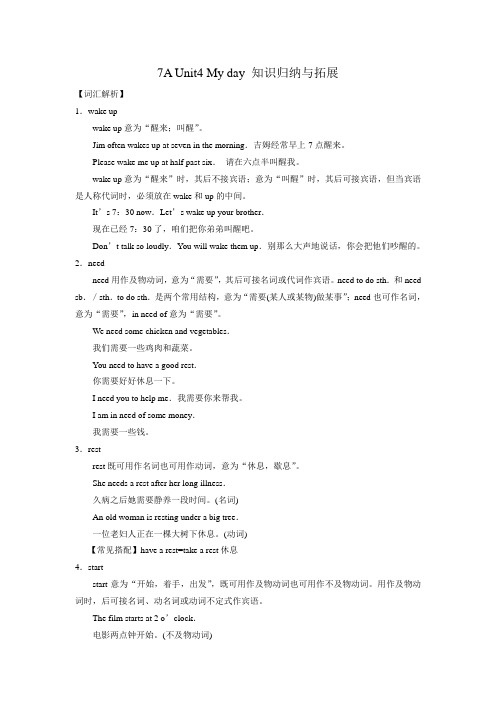
7A Unit4 My day 知识归纳与拓展【词汇解析】1.wake upwake up意为“醒来;叫醒”。
Jim often wakes up at seven in the morning.吉姆经常早上7点醒来。
Please wake me up at half past six.请在六点半叫醒我。
wake up意为“醒来”时,其后不接宾语;意为“叫醒”时,其后可接宾语,但当宾语是人称代词时,必须放在wake和up的中间。
It’s 7:30 now.Let’s wake up your brother.现在已经7:30了,咱们把你弟弟叫醒吧。
Don’t talk so loudly.You will wake them up.别那么大声地说话,你会把他们吵醒的。
2.needneed用作及物动词,意为“需要”,其后可接名词或代词作宾语。
need to do sth.和need sb./sth.to do sth.是两个常用结构,意为“需要(某人或某物)做某事”;need也可作名词,意为“需要”,in need of意为“需要”。
We need some chicken and vegetables.我们需要一些鸡肉和蔬菜。
You need to have a good rest.你需要好好休息一下。
I need you to help me.我需要你来帮我。
I am in need of some money.我需要一些钱。
3.restrest既可用作名词也可用作动词,意为“休息,歇息”。
She needs a rest after her long illness.久病之后她需要静养一段时间。
(名词)An old woman is resting under a big tree.一位老妇人正在一棵大树下休息。
(动词)【常见搭配】have a rest=take a rest休息4.startstart意为“开始,着手,出发”,既可用作及物动词也可用作不及物动词。
Unit 4 (重点知识点总结及单元测试) 2020年牛津译林版七年级上册英语同步讲义
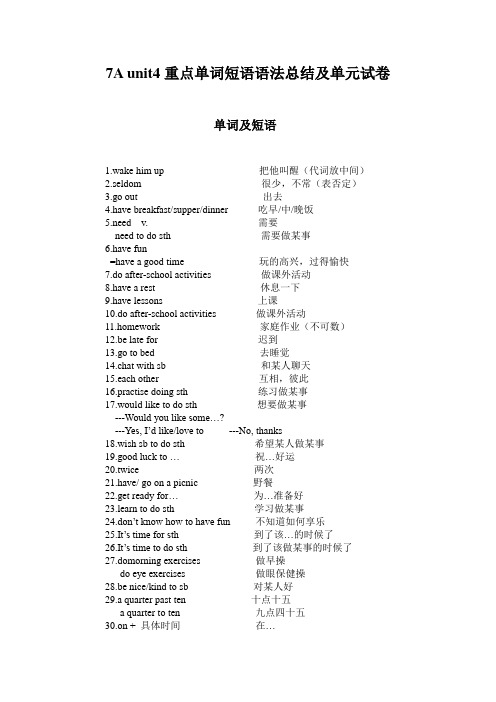
7A unit4重点单词短语语法总结及单元试卷单词及短语1.wake him up 把他叫醒(代词放中间)2.seldom 很少,不常(表否定)3.go out 出去4.have breakfast/supper/dinner 吃早/中/晚饭5.need v. 需要need to do sth 需要做某事6.have fun=have a good time 玩的高兴,过得愉快7.do after-school activities 做课外活动8.have a rest 休息一下9.have lessons 上课10.do after-school activities 做课外活动11.homework 家庭作业(不可数)12.be late for 迟到13.go to bed 去睡觉14.chat with sb 和某人聊天15.each other 互相,彼此16.practise doing sth 练习做某事17.would like to do sth 想要做某事---Would you like some…?---Yes, I’d like/love to ---No, thanks18.wish sb to do sth 希望某人做某事19.good luck to … 祝…好运20.twice 两次21.have/ go on a picnic 野餐22.get ready f or… 为…准备好23.learn to do sth 学习做某事24.don’t know how to have fun 不知道如何享乐25.It’s time for sth 到了该…的时候了26.It’s time to do sth 到了该做某事的时候了27.domorning exercises 做早操do eye exercises 做眼保健操28.be nice/kind to sb 对某人好29.a quarter past ten 十点十五a quarter to ten 九点四十五30.on + 具体时间在…on a cold morningon the evening of..31.How often……? …多长时间一次?(对频率提问)32.have fun doing sth= have a good time doing sth 做某事很开心33.life--------lives 生活,生命(可数)34.museum n. 博物馆35.know how to have fun 知道如何享乐36.learn a lot about sth 了解许多……语法时间介词频度副词注意:1.频度副词常与一般现在时态连用。
牛津译林版七年级英语上册7A Unit4单元知识点总结
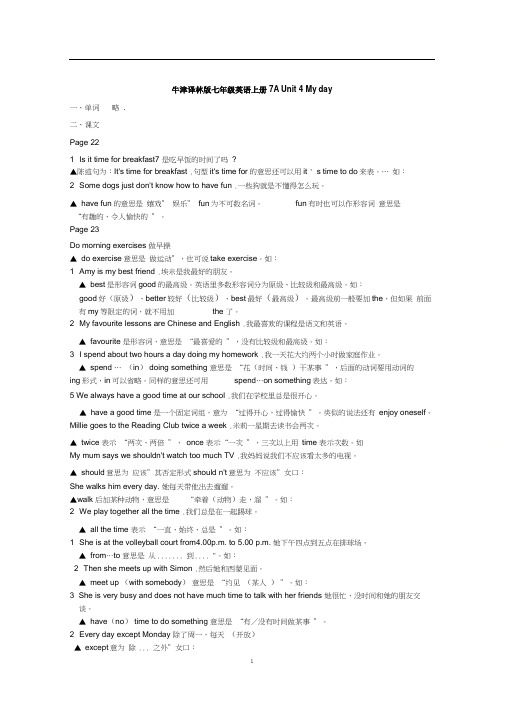
牛津译林版七年级英语上册7A Unit 4 My day一、单词略.二、课文Page 221 Is it time for breakfast7 是吃早饭的时间了吗?▲陈述句为:It's time for breakfast .句型it's time for的意思还可以用it ' s time to do来表。
… 如:2 Some dogs just don't know how to have fun .一些狗就是不懂得怎么玩。
▲have fun的意思是嬉戏” 娱乐” fun为不可数名词。
fun有时也可以作形容词意思是“有趣的,令人愉快的”。
Page 23Do morning exercises 做早操▲do exercise意思是做运动”,也可说take exercise。
如:1 Amy is my best friend .埃米是我最好的朋友。
▲best是形容词good的最高级。
英语里多数形容词分为原级、比较级和最高级。
如:good好(原级)、better较好(比较级)、best最好(最高级)。
最高级前一般要加the,但如果前面有my等限定的词,就不用加the 了。
2 My favourite lessons are Chinese and English .我最喜欢的课程是语文和英语。
▲favourite 是形容词,意思是“最喜爱的”,没有比较级和最高级。
如:3 I spend about two hours a day doing my homework .我一天花大约两个小时做家庭作业。
▲spend … (in) doing something 意思是“花(时间、钱)干某事”,后面的动词要用动词的ing形式,in可以省略。
同样的意思还可用spend…on something表达。
如:5 We always have a good time at our school .我们在学校里总是很开心。
牛津译林版七年级英语上册7A Unit4 知识点与语法点讲解与分析

牛津译林版七年级英语上册7Aunit4知识点与语法点讲解与分析知识点:1 wake up 当接代词作宾语时,代词放在中间,接名词可放后面或中间,类似词组pick up/try on/put on/take of/turn on/turn dow n2 It is time for +sth /doing sth ---- 是----- 的时候了” = It is time to do sth.【拓展】It ' s time for sb to do到某人做某事的时间了eg: It ' s time for you to do your homework— It ' s time for doing your homework.3 sleep/go to sleep/go to bed/ 区另U4 how to have fun是特殊疑问词+动词不定式"构成的不定式短语;have fun=have agood/great/wo nderful time=enjoy on eself 过得愉快"” fun 为不可数名词。
5 watch/look/see/read 区另U6 write to sb给某人写信”7 be nice to sb对某人友好”类似结构:be frie ndly to sb 对某人友好be polite to sb 对某人礼貌8 first adj/adv &n 第一,首先,最初Eg Sun day is the first day of the week.I get back home after school and I do my homework first.【注】first为序数词,前面应加定冠词the。
但序数词作定语且前面有形容词性物主代词等修饰时,不带the。
This is our first less on.固定搭配:at first起先first of all 首先【拓展】firstly adv首先,第一9. once adv 一次;一度Once用作副词,表示一次,具有数量之意,与某一特定范围连用表示频率。
七年级英语7aunit4知识点牛津译林版
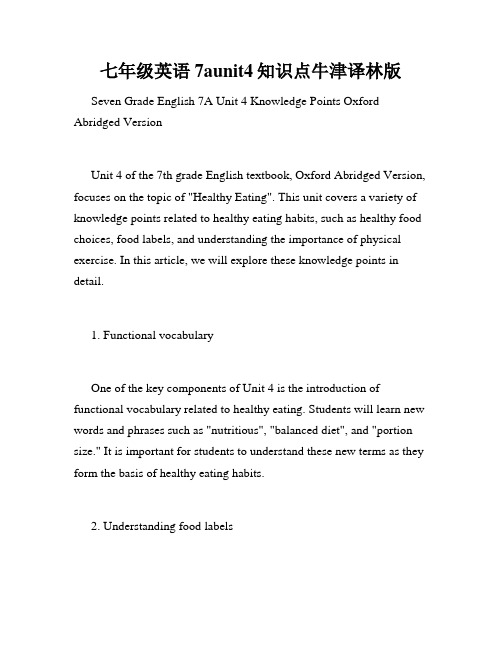
七年级英语7aunit4知识点牛津译林版Seven Grade English 7A Unit 4 Knowledge Points Oxford Abridged VersionUnit 4 of the 7th grade English textbook, Oxford Abridged Version, focuses on the topic of "Healthy Eating". This unit covers a variety of knowledge points related to healthy eating habits, such as healthy food choices, food labels, and understanding the importance of physical exercise. In this article, we will explore these knowledge points in detail.1. Functional vocabularyOne of the key components of Unit 4 is the introduction of functional vocabulary related to healthy eating. Students will learn new words and phrases such as "nutritious", "balanced diet", and "portion size." It is important for students to understand these new terms as they form the basis of healthy eating habits.2. Understanding food labelsAnother important knowledge point covered in this unit is how to read food labels. Students will learn how to identify the different types of nutrients, such as fat, salt, and sugar, and how to understand their measurements. By being able to read food labels, students can make informed decisions about their food choices.3. Healthy food choicesUnit 4 also covers the importance of making healthy food choices. Students will learn about the food groups, such as fruits and vegetables, carbohydrates, proteins, and fats, and the essential nutrients found in each group. By understanding the importance of a balanced diet and the nutrients required for healthy living, students can make better food choices.4. Exercise for a healthy lifestyleFinally, Unit 4 emphasizes the importance of physical exercise for a healthy lifestyle. Students will learn about the different types of exercise and their benefits, such as cardio, strength training, and flexibility exercises. By understanding the different types of exercise and their benefits, students can make informed decisions about their physical activity.ConclusionUnit 4 of the 7th-grade English textbook, Oxford Abridged Version, covers a variety of knowledge points related to healthy eating habits and physical exercise. By understanding functional vocabulary, reading food labels, making healthy food choices, and incorporating physical activity into their daily routine, students can develop a healthy lifestyle. By following these knowledge points, students can maintain their physical and mental health and achieve greater success in their academic and personal lives.。
个人精品制作新译林7a英语unit4单元知识点归纳及练习题
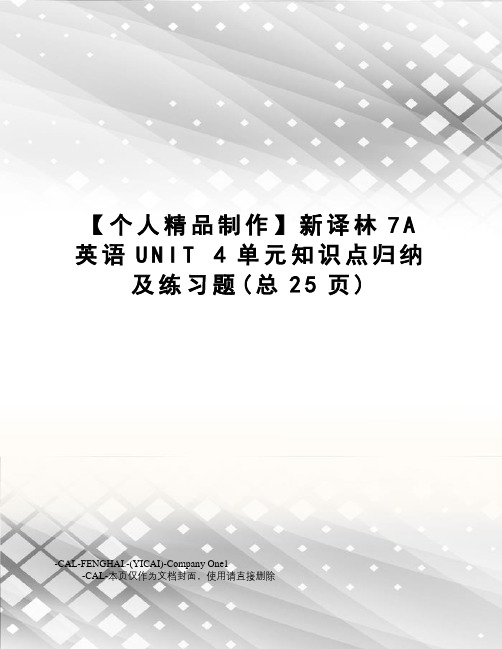
【个人精品制作】新译林7A 英语U N I T4单元知识点归纳及练习题(总25页)-CAL-FENGHAI.-(YICAI)-Company One1-CAL-本页仅作为文档封面,使用请直接删除新译林7A英语UNIT 4单元知识点归纳及练习题Unit 4一、词汇知识点整理:Wake sb up 叫醒某人go out 出去,熄灭have breakfast/lunch/dinner 吃早中晚饭have fun 玩的开心get up 起床have lessons 上课go to bed 去睡觉be late for 迟到chat with 聊天each other 相互have a good time 玩的开心all the best 一切顺利,万事如意get ready for为……准备好need a good rest 需要好好休息do morning exercises二、结构用法It is time for sth/ to do sth 到该做什么的时间到了。
have fun doing sth 高兴地做某事how to have fun 如何玩得高兴wish our team good luck.祝愿我们队好运。
have too much homework.有太多的家庭作业三、句式用法:Some dogs just don’t know how to have fun. I’m never late for school.After class, we often chat with each other or play in the playground.下课后,我们经常在一起聊天或者在操场上玩We practice after school on Wednesday afternoon.周三下午放学后我们一起训练Best wishes 美好的祝愿四、语法归纳:用in一般在“上”“下”“晚”,还有时间,年、月、季;On 指特定的某一天,日期,星期和季节At 用在时刻前,还有正午,午夜连频率副词从频率最大到频率最小依次为:always, usually, often, sometimes, seldom, never.对频率副词提问要用how often语法小练习:用所给词的适当形式填空The _______(five) day of a week is Thursday.We all like_______(play) computer gamesHe usually _______(go) to school at 8:00We don’t have classes on S______ or SundayThe _________(twelve) month of a year is December. We have sports ________(two) a week.Bob________(not do )his homework at weekends.What’s_______(you) name? _______(I) first name is Tom五、单元综合练习一、单词辨音( ) 1. A. clock B. old C. orange D. box( ) 2. A. number B. bus C. rulerD. cup( ) 3. A. pencil B. twelve C. egg D. English( ) 4. A. that B. Japanese C. clas s D. apple( ) 5. A. Chinese B. in C. hill D. this( ) 6. A. book B. good C. look D. noon( ) 7. A. goodbye B. my C. yourD. why( ) 8. A. please B. teacher C. breadD. tea( ) 9. A. listen B. Internet C. mu sic D. policeman( ) 10.A. map B. bag C. gra de D. and二、单项选择( )1. Every morning his mother_______ at sixA. wake him upB. wakes he upC. wakes up himD. wakes him up( )2. We students should not watch_______ TV or_______ films on weekdays.A. too much; too muchB. too many; too m anyC. too much; too manyD. too many; too much( )3. It's 12:00 now. It's time_______ lunch.A. to haveB. hasC. for D . A& C( )4.Tom_______ a dog. _______ name is Eddie .A. has, ItsB. have; It'sC. has; It' sD. have; Its( )5. Eddie is Hobo's master. He knows how to_______ Hobo.A. look atB. look forC. look ov erD. look after( )6. He enjoys_______ with his friends and___ ____ ice creams with them.A.chating; eating B. chatting; eating C. chatting; eating D. chating; eatting( )7. Chinese and History are my_______ lesson s. I like them_______.A. favourite, bestB. favourites, bestC. favourites, the bestD. the best, favourite( )8. They always do_______ activities_______.A. after-school; after schoolB. after-school; after-schoolC. after school; after schoolD. after schoo l; after-school( ) 9. We always do some reading_______ every morning.A. onB. inC. /D. for( )10.- Look, that's Mike, your classmate. -Yes: Let's go and say hello to_______.A. himB. heC. herD. her s( )11.- _______ does he go to fly kites? -_______ a month.A. How long; One timeB. How soon; OnceC. How often; Once timeD. How often ; Once( )12. Amy studies very hard. She usually_____ __ at 10. 00 p. m. .A.plays volleyball B. gets up C. goes shopping D. goes to bed( )13. Kitty goes to the Reading Club twice a week. She is very good at_______ books.A. readB. readsC. readingD. to read( )14. We'll have_______ fun in English this term.A. a lotB. lots ofC. a lots ofD. many( )15. -Your brother speaks English very well. -Yes, so he does. He practises _______ English every day.A. speakingB. speakC. speaksD. to speak( )16.Thank you me.A.for help B.for helping C.to helping D.helping( )17.________often go to school together.A.Jack and I B.I and JackC.Jack and me D.Me and Jack.( )18.We have 7 lessons every day.And Maths ________my favourite lesson.A.is B.areC.does D.am( )19.My parents ________doctors.They work har d.A.both are B.all areC.are both D.are all.( )20.________classmates are great.I love to play with________.A.Our.their B.My,they C.My,them D.My,their三、完形填空Kate 1 a happy family. She lives in Londo n(伦敦) 2 her parents. She 3 a schoolg irl. Today is Kate's birthday and she's 15 years old. Her father is 4 teacher. He works i n a school. Students think he is a good teacher.5 mother is a nurse. She is a very good nurse. Kate has a brother6 a siste r, and they study7 China. Her brother spe aks Chinese very well and has many friends there.Her sister 8 Chinese very hard and she w ants 9 a teacher 10 Chinese in the ir country.( )1. A. has B. hadC. havesD. hases( )2. A. of B. withC. andD. for( )3. A. be B. amC. isD. are( )4, A. / B. aC. anD. the( )5. A. Her B. SheC. HersD. Her's( )6. A. and B. orC. butD. too( )7. A. on B. inC. intoD. at( )8. A. study B. studiesC. studysD. studying( )9. A. be B. isC. toD. to be( )10. A. of B. forC. inD. about四、阅读理解(A)Hi, I'm John. I study in a middle school. Every morning, I get up at half past six and I go to school at seven. Lessons begin at eight. We have f our lessons in the morning and three lessons in th e afternoon. English is my favourite lesson, because we often play games in the English class.I have lunch at school. I like the school lunch and I always have rice with meat and vegetables. After lunch I often talk with my classmates.In the afternoon, lessons start at one o'clock and finish at four o'clock. I play games with my friends after school and then go home at half pa st four. I work hard every day. In the evening, I do my homework and read books. At nine o'clock I go to bed. I'm really busy every day but I like it.( )1. What time does John go to school?A.At 6. 30 a. m. B. At 7. 00 a. m. C. At 8 . 00 a. m. D. At 8. 30 a. m.( )2. What lesson does he like best?A. English.B. Maths.C. Chinese.D. Music( )3. What does he often do after lunch?A. Playing games.B. Chatting with his classmates.C. Having a rest.D. Playing balls,( )4. Where does he do his homework?A.In the classroom. B. In the school. C. At home . D. At his classmate's home( ) 5. Does John work hard?A. Yes, he doesn't.B. No, he doesn't.C. We don't know.D. Yes, he does.(B)Dear Gina,It's Monday, October 28. I'm really busy today!At 8:00, I have Chinese. I don't like Chinese. It's boring. Then at 9: 00, I have math. I like itvery much because it's interesting. Next, at 10:00, I have English. It's my favorite subject. At 11: 00, I have music. I like it because it's relaxing.I eat lunch 12:15. After lunch, I have science.It's fun. Then I have P. E. . I like it. It's e xciting. We can play soccer. After P. E., we have history. It's fun. Then I go home at around 5:00.Y ours,J ohn( ) 6. John doesn't like_______ because it's boring.A. ChineseB. mathC. musicD. history( )7.John has_______ classes on Monday.A, four B. three C. sevenD. eight( )8. John's favorite subject is .A. ChineseB. P.E.C. historyD. English( )9, John likes math because it's_______.A. relaxingB. boringC. interestingD. exciting( )10. John doesn't have_______ on Monday. A. music B. art C. P. E.D. English(C)My cousin is a sports fan.He likes basketball,football,table tennis,badminton and swimming.And he is good at playing f ootball.Beckham is his favourite football player.Mycousin is in the Football Club.When he goes sho pping,he always buys newspapers about sports and he often watches sports news.His school is very big and b eautiful.There is a football field,a badminton court and a swimming pool in his schoo l.He usually plays football with his friends after school,and he wants to be a football player when he grow s up(长大).My cousin often goes to the stadium(体育馆)to watch the football matches at the weekend.He doesn’t want to miss(错过)any match.( )11.My cousin likes_______very much.A.comic books B.watching TV C.sportsD.playing games( )12.There is________in his school.A.a football field B.a badminton cour C.a swimming pool D.A,B and C( )13.Who is his favourite football player?A.Li Tie.B.Li Weifeng.C.Yang C hen.D.Beckham.( )14.He ________goes to the stadium to watc h the football matches at the weekend.A.sometimes B.often C.neverD.usually( )15.He wants to be a ________player when he grows up.A.basketball B.football C.swi mming D.badminton五、根据句意及汉语提示完成单词1.I like climbing _______(小山).What about you? 2.They_______(通常)go shopping at the weekend. 3.There are a lot of after-school_______(活动)for us to do.4.You must do your_______(家庭作业)in the evening.5.Sandy and Amy are my_______(最好的)friends.6.Simon likes_______(聊天)with his friends after lunch.7.Do you_______(练习)basketball after school? 8.When do you_______(开始)your lessons every day.9.I want to_______(学会)how to dance well. 10.My_______ (年龄)is twelve. How old are you?六、用括号内所给词的适当形式填空1. Millie does after-school__________ (activity) at 4:30 p.n1·2. Look! The shop is_______ (close). Let's come here tomorrow.3. Thanks for_______ (organize) the class trip.4. Millie is my best friend. I usually chat with_ ______ (she) after school.5.-Which is the_______ (one) day of a week? -Sunday.6. Sally often_______ (read) newspapers after supper .7. There_______ (be) a lot of things to do at Mi llie's school.8. -_______ you_______ (have)a trip every month? -No, we don't.9. Shirley loves_______ (listen) to music at luncht ime.10. His parents say he shouldn't_______ (watch) too much TV or films.七、根据中文提示完成句子1. He goes to school at 6:30a. m.(对划线部分提问)_______ _______ does he_______ to school?2. I love reading because I want to learn more a bout the world.(对划线部分提问)_______ _______ you love reading?3. Doing morning exercises is good for us.(对划线部分提问)_______ _______ good for us?4. Millie goes to the Reading Club three times a week.(对划线部分提问)_______ _______ _______ Millie go to the Readin g Club?5.He does his homework after school.(改为否定句)He_______ _______ his homework after school. 6.It's time for class,Lucy.(改为同义句)It’s time Lucyclass.7.He goes home by bus every day.(改为同义句)He a bus every day.8. He gives me a hand. I must thank him. (合并为一句)I must thank him____________ __________me a hand.9. I like our classroom because it is clean and big.(对划线部分提问)do you like your classroom?10.Mr Green teaches English in No.2 Secondary Sch oo1.(改为一般疑问句)Mr Green English in No.2 Secondary School?八、翻译句子1.她对电脑了解很多。
译林7A Unit4复习要点
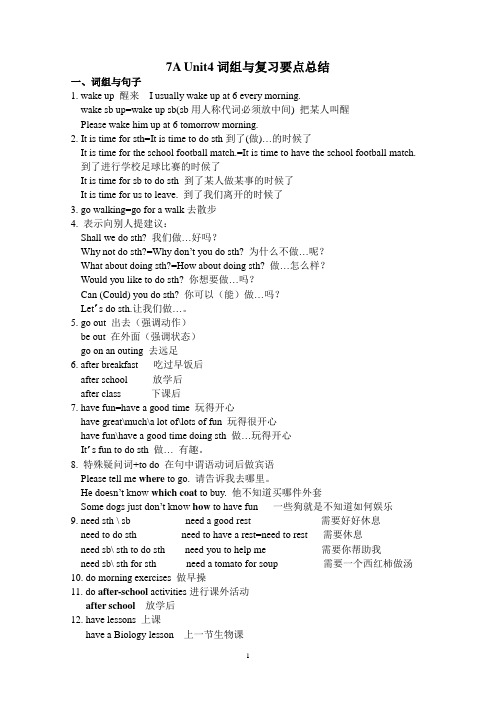
7A Unit4词组与复习要点总结一、词组与句子1. wake up 醒来I usually wake up at 6 every morning.wake sb up=wake up sb(sb用人称代词必须放中间) 把某人叫醒Please wake him up at 6 tomorrow morning.2. It is time for sth=It is time to do sth到了(做)…的时候了It is time for the school football match.=It is time to have the school football match. 到了进行学校足球比赛的时候了It is time for sb to do sth 到了某人做某事的时候了It is time for us to leave. 到了我们离开的时候了3. go walking=go for a walk去散步4. 表示向别人提建议:Shall we do sth? 我们做…好吗?Why not do sth?=Why don’t you do sth? 为什么不做…呢?What about doing sth?=How about doing sth? 做…怎么样?Would you like to do sth? 你想要做…吗?Can (Could) you do sth? 你可以(能)做…吗?Let´s do sth.让我们做…。
5. go out 出去(强调动作)be out 在外面(强调状态)go on an outing 去远足6. after breakfast 吃过早饭后after school 放学后after class 下课后7. have fun=have a good time 玩得开心have great\much\a lot of\lots of fun 玩得很开心have fun\have a good time doing sth 做…玩得开心It´s fun to do sth 做…有趣。
译林版牛津英语7AUnit4单元知识点总结+测试卷(附答案)

译林版牛津英语7AUnit4单元知识点总结+测试卷(附答案)7A Unit 4 My day单元重点知识点总览1. need to do sthneed doing2.It?s time for sth.It?s time to do sthIt?s time for sb to do sth.3.go to sleep 入睡go to bed 去睡觉4.I don?t know how to have fun 不知道怎样娱乐“疑问词+动词不定式”结构常跟在know,tell, teach 等动词之后作宾语5.have fun =have a good time=enjoy oneself 玩得开心6.exercise 操练,练习(可数名词,常用复数)exercise 锻炼(不可数名词)7.practise doing sth 练习做某事8.be nice to sb =be good to sb 对某人友好9.chat with sb 与某人聊天chat with each otherhelp each otherlearn from each other10.Children?s Day ;Teachers? Day ;Fools? Day ;Women?s Day ;Mother?s/Father?s Day11.would like to do sthwant to do sth12.have (much) time to do sth 有时间做某事a long time 很长时间all the time 一直at the same time 同时in time 及时on time 准时from time to time 有时13.dancing /swimming/singing/reading lessons14.good luck with sth 祝在某方面好运good luck to sb 祝某人好远15.have a picnic=go for a picnic 去野餐16.between 和among的区别between .....and ......between +名词的复数17.How often /how soon/how long/how far的区别18.the reason for (doing)sth19.learn from sb 向某人学习learn to do sth 学做某事learn about 了解,获悉20.in the world 在世界上all over the world 全世界travel around the world 环游世界21.be good for 对.....有好处反义be bad forbe good to 对.... 友好be good at 擅长22.too much/too many/much too的区别23.put up 张贴;举起;提出(建议)put down 写下put on 穿上;上映put away 把....收起来put out 扑灭put off 推迟24.want sb (not) to do sth. 想要某人(不)做某事语法1.时间介词:in/at/on2.频度副词的用法:never,seldom,sometimes,often,usually,always单元重点短语归纳1.wake up 醒来2.go out 出去;熄灭3.how to have fun 如何得到乐趣4.do morning exercises 做早操5.do after-school activities 做课外活动6.be late for 迟到7.be nice to sb对某人很好8.chat with each other相互聊天9.best wishes 最好的祝福10.at age 6 在6岁时11.once a year 一年一次12.plant trees 植树13.a member of ......的成员14.have a good time 玩得开心15.be good for 对.....有好处句型归纳1.My favourite lesson is English. 我最喜欢的课是英语2.We practise after school on Wednesday afternoon. 我们在周三下午放学后练习3.Amy is a member of the swimming team. Amy是游泳队的一员4.They have lots of fun on Children?s Day. 他们在儿童节玩得很开心5.I can learn a lot about the world . 我能学到很多关于世界方面的知识7A Unit4单元测试(A)卷一.短语翻译(每题1分,共10分)1.玩得愉快2.做早操3.在八点一刻4.在操场上5.一切顺利6. at work7.be good for 8.a member of9.write to sb. 10.start lessons二.单项选择(每题1分,共15分)( ) 1. The teacher says we shouldn?t read comic booksA. much tooB. too muchC. many tooD. too many ( ) 2. his father, David Beckham playing football.A. Like,; likesB. Likes; likeC. Like; likeD. Likes; likes ( ) 3. We have to do every day.A. lots of homeworkB.lots of homeworksC. lot of homeworkD. a lots of homeworks( ) 4. Her parents from Shanghai.A. are allB. all areC. both allD. are both ( ) 5.----Open the door please.I?m home.----Come in,please.The door .A. opensB. is openingC. is openD. opened ( ) 6. My bike is broken. Can I a bike you?A. borrow; toB. borrow; fromC. lend; fromD. lend; to ( ) 7. Please have breakfast in morning. It?s good for you.A. the, aB. a, theC. /, /D. /, the ( ) 8. are in Class 12, Grade 7. in the same classA. Jimmy, I and you; We?reB. I, you and Jimmy; They?reC. Jimmy, you and I; They?reD. you, Jimmy and I; We?re( ) 9. I hope the volleyball match. I our team good luck.A. us to win, wishB. we will win, wishC. we to win, hopeD.we will win, hope( ) 10.------Do you every day?------Yes, good for our eyes.A. do eye exercise, it?sB. do eye exercises, they?reC. do eyes exercise, it?sD. do eyes exercises, they?re ( ) 11.Danie?s grandmother is very old. She can?t him well.A. listenB. listen toC. hearD. hear to ( ) 12. I?m going to Nanjing Monday morning.A. atB. inC. onD. of( ) 13. Lily playing football because she is not good at it.A. likeB. lovesC. dislikeD. dislikes ( ) 14. They always do activities .A. after-school; after schoolB. after-school; after-schoolC. after school; after schoolD. after school; after-school( ) 15.I like to TV, but my father likes to books.A. watch; readB. watch; lookC.watch; seeD. read; look at 三.完型填空(每题1分,共10分)Dear Annie,Thank you 1 your letter. I?m glad you like your school.I go to school from Monday 2 Friday. We 3 four classes in the morning and two classes in the afternoon. We have many things4 after class. On Monday and Wednesday afternoon we have5 .On Tuesday afternoon some of6 have a7 class and onThursday afternoon some have a drawing class. On Friday afternoon, we practice 8 English. My Chinese friends would like 9 with me in English. They think I am like an English teacher. Isn?t it great?On Saturdays and Sundays I 10 go to school. Very often I go to the parks and have a good time with my family there.Yours,Henry ( ) 1.A.to B.of C.for D.with( ) 2.A.to B.on C.for D.with( ) 3.A.has B.having C.have D.had( ) 4.A.doing B.does C.do D.to do( ) 5.A.sport B.sports C.some sport D.a sport ( ) 6.A.we /doc/51e483be7e21af45b207a87f.html C.them D.they( ) 7.A.sing B.sings C.singing D.sang( ) 8.A.speak B.to speak C.speaks D.speaking ( ) 9.A.to talk B.talk C.talks D.talking ( )10.A.don?t B.doesn?t C.not D.can?t四.阅读理解(每题2分,共30分)AMr Smith is a teacher of English. He comes from America. He teaches English in China. He speaks Chinese quite well.He reads a lot of books and his wife often writes books for the students at home. Mr Smith gets up at five in the morning. He leaves home at ten to six. He begins the first lesson at 8:00. He teaches English every day except Saturday and Sunday. At ten to twelve he finishes his lessons. Ten minutes later he has lunch. In the afternoon, he often plays games with his students. Sometimes he teaches his students in his office. Supper time is at about six. After that, he reads newspapers and watches TV. At about ten to eleven he goes to bed.( ) 1. Mr.Smith is .A.a ChineseB.an EnglishmanC.a workerD.an American ( ) 2. He leaves home at .A.6:10B.5:50C.7:10D.6:50( ) 3. He doesn't have any English classes on .A.SaturdayB.SundayC.FridayD.Saturday and Sunday( ) 4. He has lunch at .A.12:30B.12:00C.13:30D.13:00( ) 5. He watches TV or reads newspaper supper.A.beforeB.afterC.atD.inBMay 10th is Meg?s birthday. She gets a gift. It is a new coat from her sister. The coat is very beautiful and she feels very happy.One day,Meg finds that a button(纽扣)of her coat is lost. She looks for the button everywhere,but she can’t find it.The next day,she doesn?t wear that coat to school and feel sad all day.After school, she goes to the clothes shops and wants to buy that kind of clothes.But she feels disappointed.Meg tells her sister about that,her sister says,“We can change all the buttons.Then the buttons will be the same.”The coat is beautiful again and Meg feels happy again. ( ) 6.Meg?s sister buys for her on her birthday.A.some buttonsB.a new coatB.C.a new bike D.some flowers( ) 7.How does Meg feel when she doesn?t wear that coat?A.She feels happy.B.She feels bored.C.She feels excited.D.She feels sad.( ) 8.What does Meg?s sister do at the end of the story?A.She changes all the buttons of the coat.B.She buys another coat again.C.She buys a button in the clothes store.D.She goes to the clothes store and changes the coat.( ) 9.What does the underline word “disappointed” mean in Chinese?A.兴奋的B.失望的C.难过的D.高兴的( ) 10.What?s the best title for the passage?A.A lost buttonB.A lost coatC.A kind sisterD.A clothes storeCMy daughter Eyen is ten years old. She is in Grade Three in a primary school. She is a cute girl though she has some strange ideas sometimes.One day she asks me, “Mum, what is your favorite subject?”I think for a while and answer, “ It is difficult to tell. I love singing, so music is my favorite. And I am good at English. My history teacher also s ays I am excellent. Well, I can say I don?t like Science. But Science is important for us, you know. So you must do well in it. What is your favorite subject, Eyen? Tell me something about your subjects, dear.”I like Chinese. It is easy. I like English because my English teacher likes me very much. I can?t stand Maths. It is serious and sad.”“Do you mean your Maths teacher is serious and sad?”“No, it is Maths, not the Maths teacher.”“Why do you think so?”“Because Maths has so many problems! Isn?t it sad all day?”( ) 11. Eyen is ______ years old. She is a ________.A. ten; middle school studentB. nine; middle school studentC. nine; primary school studentD. ten; primary school student( ) 12. The mother doesn?t like ______ thoug h it is important.A.musicB. MathsC. EnglishD. Science ( ) 13. The girl thinks _____ is serious and sad.A.Her Maths teacherB. MathsC. her Chinese teacherD. Chinese ( ) 14. Why doesn?t the girl like Maths?A.Because it is too easyB. Because it is difficult to learnC.Because there aren?t many problems in it.D. Because her teacher doesn?t like her at al l.( ) 15.Which subject does Eyen like?A.Chinese and MathsB. Chinese and EnglishC. English and MathsD.music and English五.任务型阅读(每题1分,共10分)Hi! I am Mike. I have a sister and two brothers. We live in a happy family. Nancy is my sister. She is the oldest. She is a kind girl. She is beautiful. She likes learning. She studies very hard. She gets up early and finishes hr breakfast quickly. Then she goes to school by bike. David is my brother. He is older than me. But he is a little lazy. He gets up late and then washes his face, brushes his teeth in a hurry. Then he goes to the bus stop without breakfast. He usually plays basketball after school. In the evening, he seldom does homework. He goes to bed late. Jack is our little brother. He is a lovely boy. He gets up very slowly and then he usually takes a shower before breakfast. He goes to school in his father?s car. He likes watching TV in the evening.Name Nancy David Jack Personality(个性) She is 1 . He is a little lazy. He is 2 .How to go to school?She 3 to school. He goes to school by4 .He takes a 5 toschool.Habit She finishes herbreakfast 6 He 7 have breakfast. He usually takes ashower 8 breakfast.9 She likes studying. He likes playing10 . He likes watching TV.1.__________2.__________3.__________4._________5.__________6.__________7.__________8.__________9.__________ 10.__________ 六.用所给单词适当形式填空(每题1分,共15分)1.Yao Ming and Lin Shuhao are both basketball (play).2.What about (go) on a picnic next Sunday?3.He enjoys (listen) to music.4.I have many different (kind) of books.5.This is our (one) English lesson.6.We have lots of (activity) after school every day.7.Some children don?t know how (have) fun.8.My mother goes to the supermarket (two) a week.9.Please tell me about your (like) and dislikes.10.Thank you for (buy) me a new pen.11.Let?s help Jack (do) Chinese exercise.12.We should practice (speak) English more.13.Sometimes Jim with his parents (eat) dinner at Shanghai Restaurant.14.Which do you like (good), apples, oranges or pears?15.Lucy, (wake) up, it?s too late.七.首字母填空(每题1分,共10分)Today more and more students are getting shorter sleeping time.Most students sleeps for fewer than(少于) eight h 1 every night, as(因为) they have m 2 homework to do. Some homework is given by the school teachers, and some is from their p 3 . Also, some students don?t know how to save(节约) the t 4 . They aren?t careful enough when they are d 5 their homework, so it t 6 them lots of time. Some students have to get up e 7 to read English in the morning. Some want to get to school on time, b 8 their homes are far away from the school.We hope t 9 and parents should cut down(减少) on the homework, so that children can have more free time to e 10 their childhood(童年).7A Unit4单元测试(A)卷参考答案一.短语翻译(每题1分,共10分)1.have fun2.do morning exercises3.at a quarter past eight4.in the playground5.all the best6.在上班7. 对........有好处8..........的一员9.给某人写信10.开始上课二.单项选择(每题1分,共15分)1-5DAADC 6-10BDDBB 11-15CCDAA三.完型填空(每题1分,共10分)1-5 CACDB 6-10 BCDAA四.阅读理解(每题2分,共30分)1-5 DBDBB 6-10 BDABA 11-15 DDBBB五.任务型阅读(每题1分,共10分)1.kind2.lovely3.rides4.bus5.car6.quickly7.doesn?t8.before9.Hobbies 10.basketball六.所给词适当形式填空(每题1分,共15分)1.players2.going3.listening4.kinds5.first6.activities7.to have8.twice9.likes 10.buying11.do 12.speaking 13.eats 14.best 15.wake 七.首字母填空(每题1分,共10分)1.hours2.much3.parents4.time5.doing6.takes7.early8.but9.teachers 10.enjoy7A Unit4单元测试(B)卷一、短语翻译(每题1分,共10分)1.have fun __________________2.做课外活动____________3.at a quarter past nine ________4.做早操________________5.chat with each other __________6. be late for school ________7.tell you about my life __________ 8. 在校足球队____________9.once a month _______________ 10.从周一到周五_________二、单项选择(每题1分,共15分)( )1.(2014襄阳)-_____does your father allow you to surf the Internet?- Only once a week.A. How farB.How longC.How oftenD.How much ( )2.(2014河南)-Where shall we eat tonight?- Let?s call Harry.He ___ knows the best places to go .A.onlyB. nearlyC.seldomD.always( )3.(2014抚顺)- We?ll have a school trip to Fuzh ou City Museum next week.- ____.And I?m sure you?ll learn a lot.A.Have funB. Cheer upC. Best wishesD. Never mind ( )4.(2013孝感)-Why are you so tired these days?-Well, I have _____ homework to do.A.too muchB.too manyC.much tooD.many too( )5.(2013重庆)-_____ does your father play tennis after work?- Every Tuesday and Thursday.A.How oftenB.How soonC. WhereD. Why( )6.(2013上海) Wow! Ten students in our class will celebrate their fourteenth birthdays _____ October!A.onB.inC.atD.to( )7.(2013北京)Lucy lived in Beijing from 2008 ____ 2012.A.onB.atC.toD.of( )8.(2013菏泽)The World Health Organization has given some advice on ____to protect us from being infected(感染)with H7N9.A.whereB.whatC.howD.when( )9.(2013北京)-Which do you prefer, tea _____coffee?-Tea,please.A.butB.orC.soD.and( )10.(2014济南)-Would you like ____ Emily and Carol?-Of course. I hear they are twins and play the piano well .A.metB.meetsC.to meetD.meet( )11.We can see a playground _____ the two tall buildings.A.betweenB.amongC.inD./( )12.Peter and I______ students. We _____ reading newspapers.A.are both,both likeB.are both,like bothC.both are,both likeD.both are,like both( )13.I often ____ from school with my friend Millie.A.go back to homeB.goes back homeC.goes back to homeD.go back home( )14.-How long do you spend _____ homework every day? - Twenty minutes.A.doB.to doC.doingD.does( )15.-Who ____ in the morning every day?- Nobody.A.wake you upB.wake up youC.wakes you upD.wakes up you三、完形填空(每题1分,共10分)The Spring Festival is the Chinese__1___. It usually comes in January or February. Everyone in China_2___ the Spring Festival very much. When the Spring Festival _3____, Simon usually helps his parents____4___ their house and do some shopping and other__5____. ___6__ that day, everyone in China eats dumplings, New Year?s cakes and some_7____ delicious food. Simon likes New Year?s cakes, but Sandy says dumplings are __8____ than New Year?s cakes. The Chinese people eat New Year?s cakes and dumplings __9___ their houses.__10___ happy they are!( ) 1. A. New Year?s Day B. Teachers? DayC. Children?s DayD. Mid-autumn Day( ) 2. A. thanks B. calls C. looks D. likes( ) 3. A. goes B. comes C. takes D. celebrates ( ) 4. A. want B. get C. come D. clean ( ) 5. A. housework B. families C. homework D. shopping ( ) 6. A. In B. At C. On D. For( ) 7. A. another B. other C. others D. the other ( ) 8. A. tired B. better C. nice D. the nicest ( ) 9. A. in B. at C. with D. outside ( ) 10.A. WhatB. What aC. How aD. How四、阅读理解(每题2分,共30分)ALisa goes to school on foot every day. One morning, Lisa leaves home after breakfast without an umbrella. Then it begins to rain. The rain becomes heavier and he avier. Lisa?s mother worries about her daughter and decides to find Lisa to give her an umbrella. She drives along the way her daughter always walks. She looks left and right through the car windows to look for Lisa. Finally, she finds Lisa walking in the street happily. She also finds that every time lightning strikes, Lisa will stop, look up at the sky and smile. Lisa?s mother is very surprised. She shouts to Lisa, “Lisa, what are you doing?” She answers, “God is taking photos of me, so I smile!”( ) 1. How is the weather according to the passage?A. HotB. WarmC. RainyD. Cold( ) 2. Does Lisa go to school with an umbrella?A. Yes, she is.B. No, she isn?tC. Yes, she doesD. No, she doesn?t ( ) 3. How does Lisa?s mother go to send Lisa an umbrella?A.On footB. By bikeC. By carD. By bus( ) 4. Which is Not true according to the passage?A. Lisa is afraid of the lightning.B. Lisa enjoys the rainingC..Lisa is lovely.D..Lisa?s mother cares for her daughter.( ) 5. Which is the best title for the passage?A bad day B. An umbrella C. Smile D. A great motherBOn Christmas Eve, the night before Christmas Day, children are very happy. They put their stockings at the end of their beds before they go to bed. They want Father Christmas to give some presents. Father Christmas is a very kind man. He comes on Christmas Eve. He lands on top of each house and comes down the chimney into the fireplace and brings children a lot of presents.Christmas Day always begins before breakfast. Children wake up very early. They can?t wait to open the presents in their stockings. Then they wake up their parents and shou t … Merry Christmas!?Do you know what Christmas means? Christmas Day is the birthday of Jesus Christ. When Christ was born, many people gave him presents. So today, people still do the same thing to the children.( ) 6. Christmas Eve is__________.A. the night before 24 DecemberB. the night after 25 DecemberC. the night of 24 DecemberD. the night of 25 December( ) 7. Father Christmas often puts the presents________.A. into children?s hatsB. into children?s stockingsC. under children?s bedsD. into children?s shoes( ) 8. Father Christmas comes into the house through the_______.A. windowB. front doorC. chimneyD. back door( ) 9. On the morning of Christmas Day, children say?_____? to their parents.A. Good morningB. Happy New YearC. Best Wishes to youD. Merry Christmas( ) 10. On Christmas Day, what do people often do to children?A.Give presentsB. Ask for moneyC. ask for presentsD. Give noneCJohn is a middle school student. He is sixteen years old now. One day he had a terrible cold and a fever. He felt bad and couldn't eat anything. So he went to see a doctor. The doctor gave him a bottle of medicine. These are the words on the bottle of the medicine.Cold medicineYou must shake(摇晃) it before you take it. Take it three times a day after meals. Dose (剂量):Age: over 15 2 teaspoons(茶匙) a day8-14 1 teaspoon a day5-7 1/2 teaspoon a dayThe children under 4 years old can't take this medicine.。
牛津译林英语7A Unit 4 重点短语,句型及语法精讲精练(含答案)

7A U4 重点短语,句型及语法精讲精练一,必会的重点短语和句型1. 我们在山上散步好吗?Shall we go walking in the hills?表示提出建议的句型有:1).Shall we do sth.? 2).What/ How about doing sth.?3).Let’s do sth., shall we? 4).Would you like to do sth.? 5).Could/ Would you please do sth.?2.我很少外出。
I seldom go out.我总是需要好的休息。
I always need a good rest.我上学从不迟到。
I’m never late for school. be late for…我们总是在校过得愉快。
We always have a good time at school.表示频度的副词(从大到小):一直,总是always, 通常usually,经常often, 有时sometimes, 很少seldom, 从不never3.吃早饭/中饭/晚饭/三餐have/eat breakfast/lunch/ supper/dinner4.把它叫醒wake it up 把Eddie叫醒wake Eddie up/ wake up Eddie5. 是吃早饭的时候了。
It’s time for breakfast. It’s time to have breakfast. It’s time for having breakfast.6. 一些狗狗就是不知道如何找乐子。
Some dogs just don’t know how to have fun.知道如何做某事know how to do sth.玩得开心have fun/have a good time/ enjoy oneself(doing sth.)7. 起床get up 去睡觉go to bed8. 首先做早操do morning exercises frrst9. 上课have lessons/ classes 10. 做家庭作业do homework11. 进行课外活动do after-school activities12. 你几点上课?8:15。
新苏教译林版7AUnit-4-知识点总结

7A Unit4 My day知识点复习一、重点词组:1.wake up2.her online friend3.her likes and dislikes4.get up5.do morning exercises6.have lessons7.do after-school activities8.at a quarter past eight9.a student at Sunshine Middle School10.from Monday to Friday11.go to the library12.a Reading Club13.best wishes14.a member of the school swimming team15.have great fun16.all the best17.dancing lessons18.go roller skating19.between ---and---20.visit the museum21.twice a month22.go on picnics / go on a picnic23.clean the street24.be good for sb25.help sb do/to do/with sth26.get ready for二、重点句型1. Is it time for breakfast?2. Shall we go walking in the hills?3. I seldom go out.4. After lunch, I always need a good rest.5. Some dogs just don’t know how to have fun.6. I’m never late for school.7. What time do you start lessons?8. They are all nice to me.9. After class, we often chat with each other.10. We often read books there on Tuesday and Thursday.11. I am in the school volleyball team.12. We practice after school on Wednesday afternoon.13. We always have a good time at school.14. My favourite subject is English.15. Thanks for your email.16. I would like to tell you about my life here.17. Sandy does not have much time to play tennis.18. I hope everyone can come and watch the game.19. Wish our team good luck.20. What do you like to do at weekends?21. The subjects are interesting.22. I can learn a lot about the world.23. It is fun.24. We always have too much homework.25.I need to spend more time on English.三、重点语法知识☆ in, on, at表示时间的用法1. in表时间时,指在一天中的一段时间或与年、月、季节连用。
[译林版]7A Unit4 My day详细知识点整理+练习题
![[译林版]7A Unit4 My day详细知识点整理+练习题](https://img.taocdn.com/s3/m/c3d0e8e608a1284ac850432d.png)
7A Unit4 My day详细知识点整理+练习题一、词汇A. 根据汉语意思,写出单词1. We often do after-school _________ (活动) in the playground.2. I have a lot of _________(家庭作业) to do every day.lie is ________(从不) late for school.4.—Ex cuse me, what’s the time now? —It’s a _______(一刻钟)to nine.5.________(首先), let’s play a game.6.My mother seldom _________(聊天)with her friends on the Internet.7.Can you help me put up the map of the ___________(世界)on the wall?8.We should _________(学习)from Lei Feng.9.There’s a bus at ten _______(晚于)six.10.My ______ (生活) here is very interesting.B. 词性转换1. The Twins don’t know how __________(play) football.2. You are not having much ______(lucky)today, are you?3. Is it time _________ (have) lessons?4. I often practise _____________ (play) volleyball.5. She likes _______(help)others all the time(一直).6. She’d like _________ (see) a film.7. Let’s do morning_________ (exercise) now.8.Sandy doesn’t have much time _______ (play) tennis .9.We enjoy_______(chat)with each other after class.10. Look! Everyone _______(have)a new English book now.二、语言·知识点Comic Strip &Welcome to the unit1.Wake upwake them/me/her/you/him up (代词宾格放中间)类似put on, take off, try on…wake up与get upget sb. up×I get up at seven every Sunday.Get up, Mike.【例题】1.去把那只猫叫醒。
Unit 4 (重点知识点总结及单元测试) 2020年牛津译林版七年级上册英语同步讲义

7A unit4重点单词短语语法总结及单元试卷单词及短语1.wake him up 把他叫醒(代词放中间)2.seldom 很少,不常(表否定)3.go out 出去4.have breakfast/supper/dinner 吃早/中/晚饭5.need v. 需要need to do sth 需要做某事6.have fun=have a good time 玩的高兴,过得愉快7.do after-school activities 做课外活动8.have a rest 休息一下9.have lessons 上课10.do after-school activities 做课外活动11.homework 家庭作业(不可数)12.be late for 迟到13.go to bed 去睡觉14.chat with sb 和某人聊天15.each other 互相,彼此16.practise doing sth 练习做某事17.would like to do sth 想要做某事---Would you like some…?---Yes, I’d like/love to ---No, thanks18.wish sb to do sth 希望某人做某事19.good luck to … 祝…好运20.twice 两次21.have/ go on a picnic 野餐22.get ready f or… 为…准备好23.learn to do sth 学习做某事24.don’t know how to have fun 不知道如何享乐25.It’s time for sth 到了该…的时候了26.It’s time to do sth 到了该做某事的时候了27.domorning exercises 做早操do eye exercises 做眼保健操28.be nice/kind to sb 对某人好29.a quarter past ten 十点十五a quarter to ten 九点四十五30.on + 具体时间在…on a cold morningon the evening of..31.How often……? …多长时间一次?(对频率提问)32.have fun doing sth= have a good time doing sth 做某事很开心33.life--------lives 生活,生命(可数)34.museum n. 博物馆35.know how to have fun 知道如何享乐36.learn a lot about sth 了解许多……语法时间介词频度副词注意:1.频度副词常与一般现在时态连用。
江苏译林7A U1-4 重点知识点
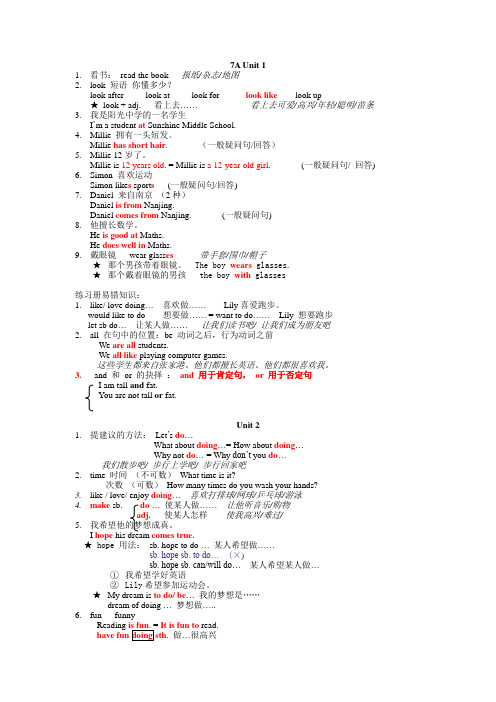
7A Unit 11.看书:read the book 报纸/杂志/地图2.look 短语你懂多少?look after look at look for look like look up★look + adj. 看上去……看上去可爱/高兴/年轻/聪明/苗条3.我是阳光中学的一名学生I’m a student at Sunshine Middle School.lie 拥有一头短发。
Millie has short hair. (一般疑问句/回答)lie 12岁了。
Millie is 12 years old. = Millie is a 12-year-old girl. (一般疑问句/ 回答) 6.Simon 喜欢运动Simon like s sport s (一般疑问句/回答)7.Daniel 来自南京(2种)Daniel is from Nanjing.Daniel comes from Nanjing. (一般疑问句)8.他擅长数学。
He is good at Maths.He does well in Maths.9.戴眼镜wear glass es带手套/围巾/帽子★那个男孩带着眼镜。
The boy wears glasses.★那个戴着眼镜的男孩 the boy with glasses练习册易错知识:1.like/ love doing…喜欢做……Lily喜爱跑步。
would like to do 想要做…… = want to do……Lily 想要跑步let sb do…让某人做……让我们读书吧/ 让我们成为朋友吧2.all 在句中的位置:be 动词之后,行为动词之前We are all students.We all like playing computer games.这些学生都来自张家港。
他们都擅长英语。
他们都很喜欢我。
3.and 和or 的抉择:and 用于肯定句,or 用于否定句I am tall and fat.You are not tall or fat.Unit 21.提建议的方法:Let’s do…What about doing…= How about doing…Why not do… = Why don’t you do…我们散步吧/ 步行上学吧/ 步行回家吧2.time 时间(不可数)What time is it?次数(可数)How many times do you wash your hands?3.like / love/ enjoy doing…喜欢打排球/网球/乒乓球/游泳4.make sb. do…使某人做……让他听音乐/购物adj. 使某人怎样使我高兴/难过/5.我希望他的梦想成真。
初中英语 牛津译林版 7A Unit4 语法讲解及针对练习
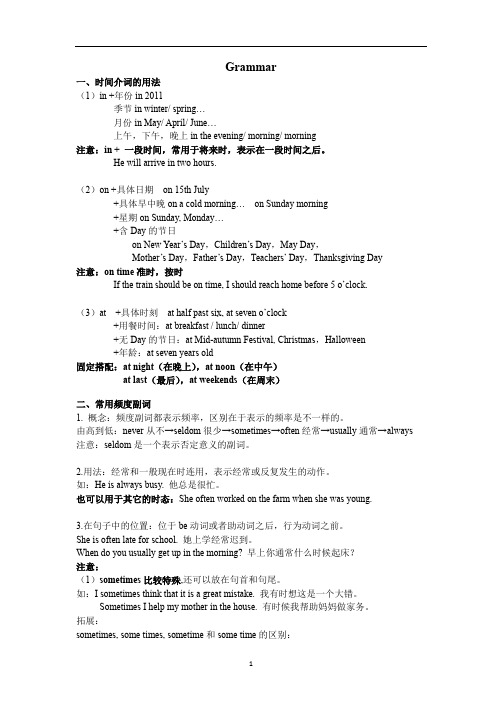
Grammar一、时间介词的用法(1)in +年份in 2011季节in winter/ spring…月份in May/ April/ June…上午,下午,晚上in the evening/ morning/ morning注意:in + 一段时间,常用于将来时,表示在一段时间之后。
He will arrive in two hours.(2)on +具体日期on 15th July+具体早中晚on a cold morning… on Sunday morning+星期on Sunday, Monday…+含Day的节日on New Year’s Day,Children’s Day,May Day,Mother’s Day,Father’s Day,Teachers’ Day,Thanksgiving Day注意:on time准时,按时If the train should be on time, I should reach home before 5 o’clock.(3)at +具体时刻at half p ast six, at seven o’clock+用餐时间:at breakfast / lunch/ dinner+无Day的节日:at Mid-autumn Festival, Christmas,Halloween+年龄:at seven years old固定搭配:at night(在晚上),at noon(在中午)at last(最后),at weekends(在周末)二、常用频度副词1. 概念:频度副词都表示频率,区别在于表示的频率是不一样的。
由高到低:never从不→seldom很少→sometimes→often经常→usually通常→always 注意:seldom是一个表示否定意义的副词。
2.用法:经常和一般现在时连用,表示经常或反复发生的动作。
如:He is always busy. 他总是很忙。
牛津译林版英语7AUnit 4 My Day 词组、句型、语法及练习

牛津译林英语7A unit 4 词组、句型、语法及练习一.短语1. wake up 醒来2.wake sb. up 叫醒某人3. It’s time for sth. / It’s time (for sb.) to do sth. 是(某人)干某事的时候了4. go walking in the hills 去山上散步5. seldom go out 很少外出6. need a good rest 需要好好休息=need to have a good rest7. need to do sth. 需要做某事8. write to her online friend 写信给她的网友9. do morning exercises 做早操10. do eye exercises做眼保健操11. do some exercise 锻炼12. have lessons 上课13. start (begin) lessons 开始上课14. do after-school activities 做课外活动15. be never late for work / school上班/ 上学从不迟到16. one of ….. …….之一。
后接可数名词复数17. be all nice to sb. 都对某人很好18. chat with sb. 和某人聊天19. chat with each other 互相聊天20. help each other 互相帮助21.play in the playground 在操场上玩22.be in the school volleyball team是校排球队成员=be a member of the school volleyball team23. practise after school 放学后训练practise doing sth. 练习/训练做某事24. on Wednesday afternoon 在周三下午25.have a good time doing sth=have fun doing sth. 做某事过得愉快26. in spring / s ummer / autumn / winter27. at 6 years old 在六岁=at 6=at the age of 628. all the best 一切顺利,万事如意29. have much time to do sth.有很多时间做某事30. have no time to do sth. 没有时间做某事31. go to her dancing lessons 去上舞蹈课32. dance for half an hour 跳舞半小时33. go roller skating 去溜旱冰34. go walking 去散步35.between...and... 在...和...之间36. visit a museum 参观博物馆37.go on picnics with my family twice a month 一个月两次和我家人去野餐38. at noon 在中午39. at night 在夜里40. at work 在工作41.be good for sb.对...有益42.be bad for sb. 有…..害43. help sb. get ready for sth 帮助某人为...做好准备44.get ready to do sth 准备好做某事=be ready to do sth.45. learn a lot about sth 关于某事了解很多46. learn more about sth. 关于某事了解更多47. too much homework 太多作业48. too many lessons 太多课49.much too cold (hot)太冷(热)二.句子:1. Some dogs just don’t know how to have fun. 有些狗就是不知道怎样玩乐。
牛津译林版英语7A Unit4 My day知识点归纳

牛津译林版英语7A Unit4 My day知识点归纳XXX.你现在开始做作业吧。
(及物动词)I XXX.我昨天开始读一本新书。
(动名词作宾语)I started to learn English when I was six years old.我六岁时开始学英语。
(动词不定式作宾语)语法点拨】一般现在时的用法1.表示经常性的动作或状态。
I usually get up at six o’clock.我通常六点钟起床。
2.表示客观真理。
XXX moves around the sun.地球绕太阳转。
3.表示现在的状态或情况。
I am a student.我是一名学生。
4.表示将来。
XXX.明天早上六点火车开。
5.表示命令、建议、邀请等。
Don’t smoke in the office.办公室里不准吸烟。
Let’s have a walk after supper.晚饭后我们去散步吧。
6.表示评论、描写、说明等。
This book tells us a lot about Chinese history.这本书向我们讲述了很多中国历史。
写作指导】本文主要介绍了一些常用的词汇及语法点,如动词的用法、时态等。
在写作中,要注意正确使用这些词汇和语法点,以使文章表达准确、流畅。
同时,也要注意文章的格式,如段落的分隔等。
We learn English in school。
It's never too late to learn。
Common phrases with "learn" include "learn about" and "learn from." "Learn" emphasizes the act of learning and acquiringknowledge。
while "learn about" emphasizes gaining n and understanding.Just learning about English doesn't mean you've learned the language。
译林牛津重点初中英语7年级上册(7A)第四单元Unit4知识点汇总
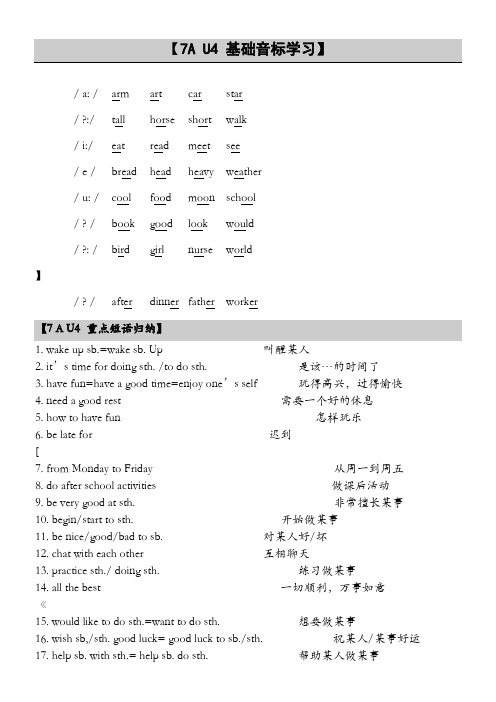
/ a: / arm art car star/ ?:/ tall horse short walk/ i:/ eat read meet see/ e / bread head heavy weather/ u: / cool food moon school/ ? / book good look would/ ?: / bird girl nurse world】/ ? / after dinner father worker【7 A U4 重点短语归纳】1. wake up sb.=wake sb. Up 叫醒某人2. it’s time for doing sth. /to do sth. 是该…的时间了3. have fun=have a good time=enjoy one’s self 玩得高兴,过得愉快4. need a good rest 需要一个好的休息5. how to have fun 怎样玩乐6. be late for 迟到[7. from Monday to Friday 从周一到周五8. do after school activities 做课后活动9. be very good at sth. 非常擅长某事10. begin/start to sth. 开始做某事11. be nice/good/bad to sb. 对某人好/坏12. chat with each other 互相聊天13. practice sth./ doing sth. 练习做某事14. all the best 一切顺利,万事如意《15. would like to do sth.=want to do sth. 想要做某事16. wish sb,/sth. good luck= good luck to sb./sth. 祝某人/某事好运17. help sb. with sth.= help sb. do sth. 帮助某人做某事18. go roller skating 溜旱冰19. between Sunshine Middle School and Moonlight Middle School在阳光中学和月光中学之间20. Sunshine Sports Centre 阳光体育中心21. at/on weekends=at/on the weekends 在周末[22. first=at first=first at all 首先23. visit the museums 参观博物馆24. twice a month 一个月两次25. go on a picnic=have a picnic 去野营26. once a week 一个星期一次27. go on a class/autumn trip 去班级/秋天之旅28. be good/bad for sb. 对某人有利/害29. get ready for sth. 为某事做好准备~30. learn a lot about sth.=know much about sth. 知道很多有关某事【7A U4 重点语法点拨】时间介词(at, in ,on) 的用法1.at(1)时间的一点、时刻等。
牛津译林版七年级上册第四单元知识点
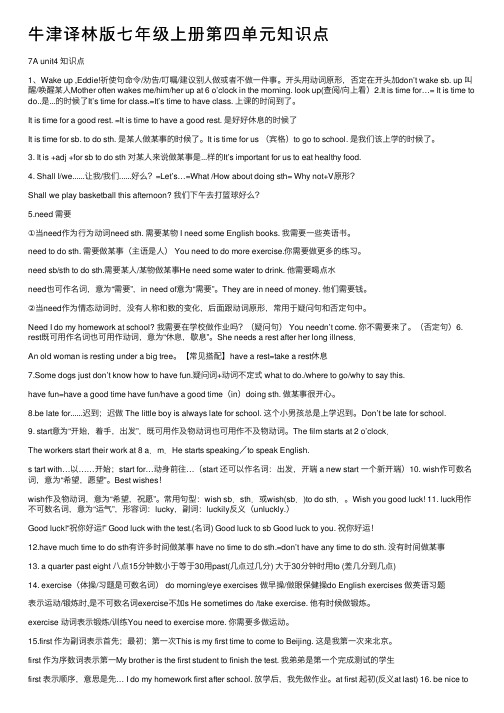
⽜津译林版七年级上册第四单元知识点7A unit4 知识点1、Wake up ,Eddie!祈使句命令/劝告/叮嘱/建议别⼈做或者不做⼀件事。
开头⽤动词原形,否定在开头加don’t wake sb. up 叫醒/唤醒某⼈Mother often wakes me/him/her up at 6 o’clock in the morning. look up(查阅/向上看)2.It is time for…= It is time to do..是...的时候了It’s time for class.=It’s time to have class. 上课的时间到了。
It is time for a good rest. =It is time to have a good rest. 是好好休息的时候了It is time for sb. to do sth. 是某⼈做某事的时候了。
It is time for us (宾格)to go to school. 是我们该上学的时候了。
3. It is +adj +for sb to do sth 对某⼈来说做某事是...样的It’s important for us to eat healthy food.4. Shall I/we......让我/我们......好么?=Let’s…=What /How about doing sth= Why not+V原形?Shall we play basketball this afternoon? 我们下午去打篮球好么?5.need 需要①当need作为⾏为动词need sth. 需要某物 I need some English books. 我需要⼀些英语书。
need to do sth. 需要做某事(主语是⼈) You need to do more exercise.你需要做更多的练习。
need sb/sth to do sth.需要某⼈/某物做某事He need some water to drink. 他需要喝点⽔need也可作名词,意为“需要”,in need of意为“需要”。
牛津译林版7AUnit4My Day基础考点大梳理

牛津译林版7AUnit4My Day基础考点大梳理一、短语归纳1.wake up醒来2. go out出去3. have breakfast吃早饭4. have lunch吃午饭5. have dinner吃晚饭6. have fun玩得高兴7. get up起床8. go to school去上学9. do morning exercises做早操10. have lessons.上课11. do after-school activities进行课外活动12. watch TV看电视13. go to bed去睡觉14. be late for迟到15. in the morning在上午16. from Monday to Friday从星期一到星期五17. be good at =do well in擅长18. a lot of friends许多朋友19. be nice to sb.=be good to sb.对某人好20. after class课后21. chat with聊天22.in/on the playground在操场上23.go to the library去图书馆24.in the afternoon在下午25. read books读书26. on Tuesday在星期二27. like playing volleyball喜欢打排球28. in the school volleyball team在校排球队29. on Wednesday afternoon在星期三下午30. in the evening在晚上31. each other.互相,彼此32. have a good time have fun enjoy oneself过得愉快,玩得高兴33. best wishes最好的祝福34. go to dancing lesson去上舞蹈课35. go roller skating去溜旱冰36. goon a picnic去野餐37. once a month一月一次38.be good for 对.....好处be bad for 对.....坏处39.too much太多(的) much too (实在)太40. get ready for sth. 为某事准备好二、句法总结1. time(1)It is time for +n. 到....的时间了。
- 1、下载文档前请自行甄别文档内容的完整性,平台不提供额外的编辑、内容补充、找答案等附加服务。
- 2、"仅部分预览"的文档,不可在线预览部分如存在完整性等问题,可反馈申请退款(可完整预览的文档不适用该条件!)。
- 3、如文档侵犯您的权益,请联系客服反馈,我们会尽快为您处理(人工客服工作时间:9:00-18:30)。
7A Unit4知识点
1.would like 问,肯定回答:Yes,please. 否定回答:No,thanks.
2.对on foot或by bike提问,用how
3.“太多”much too 和too much的区别:much too+adv/adj too much= more than enough用在不可数名词前或系动词后
4.be late for 迟到
5. 怎样做某事how to do sth
6.It’s time for +n 或It’s time to +do sth ,是做……的时间了
7.have much time to do sth有太多的时间做某事
没有太多的时间做某事have no time to do wth
8.叫醒某人wake sb.up 9.对多长时间提问用how long
10.告诉某人关于某事tell sb. about ath.
11.做早操do morning exercises 表示作业时,exercise不加s
12.感谢某人做某事thank sb. for doing sth.
13.在...的年龄at the age of
14...lessons, 在lessons前加动名词
歌唱课______________ 阅读课_________________
15.课后活动after-school activities / activities after school
16.go +doing 去做某事
17.练习做某事practise doing sth
18.It is +adj +for sb to do sth 对某人来说做某事是...样的
19.get ready for 为...做好准备20.全世界around the world 21.in,on,at 的用法: in:一天中的某一段时间;月份;季节;年
on:某天;日期;特殊一天的某个部分;特殊的假日
at:一天的某个时间;年龄
22.对频率副词或状语如:once a week; three times a month; never; always;usually等提问,用how often提问.
23.玩得高兴have fun= have a good time= enjoy oneself
24.also(也),与too同义.一般置于行为动词之前,be动词或助动词之后,too一般置于句尾. 否定含义的“也”是“either”.
25.don’t +do sth 加动原26.live with 和……一起住
27.walk home =go home on foot 步行回家
28.空闲时间free time time表示“次数”时,有复数形式
词组:
wake up醒来go walking去散步
go out出去need a good rest需要好好休息do morning exercises做早操do after-school activities进行课外活动at a quarter past eight在八点一刻have lessons上课each other互相best wishes最好的祝愿go roller skating 去溜旱冰
知识点练习
1.Don’t __________________class. 上课不要迟到了。
2.-Is it time________ supper? -Yes,it is.
3.We have ___________(太多)homework to do every day.
4.It’s 7:00, Tom’s mother ____________________.(叫醒他)
5.-____________does David play football every day? –Half an hour.
6.-Does Amy do morning _________ every day?
-Yes.She takes some ___________for 40 minutes every day.(exercise)
7.I start go to school_______ the age of 8.
lie goes to her _____________(舞蹈)lessons every Saturday.
9.Let’s go ________(walk)after supper.
10.The boys have ___________________________________(一点课外活动)。
11.Tim __________________________________.(每天练习跑步)
12.It’s ______________________________________(做早操对我们是有好处的)
13.We should_________________________the test.(做好准备)
14.I don’t ___________________________________(没有太多的时间打羽毛球)
15.It ______me 20 minutes _________________(我每天花费20分钟步行回家)
16.对我来说,很难在数学考试中得个高分。
It is hard for me __________________________________________________.
17.-__________ mobile phone is this? -It’s___________.(Daniel)
18.____________do you go home,on foot or by bike?
19.There is ______”s”and______”u”in the word”student”.
20.-Would you like a pie? -Yes,____________.
21.-It’s _______ late .–But I have_____homework to do.(too much,much too)
22.I want to _____________________(环游世界)when I grow up.
23.My English teacher__________________________(对我很好)
24.Do you enjoy __________________(swim)?
25.Mary has ___________ friends at her new school.(much和lots of中选)
26.___________(play) sports ________________(有好处)me.
27,_________ fine mornings, old people get together and do exercise . 28.-_________do you help your mother with the housework? –Once a week.
29.The boy ___________(like stay)at home,but today he ____________(like)go out to play.。
